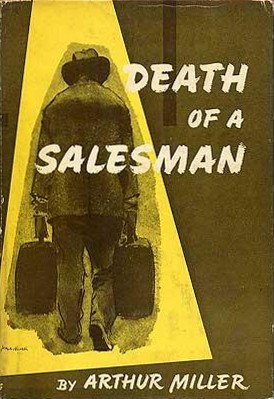Our book group choice for December 2004 is Death of a Salesman by Arthur Miller. The play opens in the Loman home in Brooklyn, New York. Willy Loman, a 63-year-old traveling salesman, is preparing to go on a business trip. He is anxious and distracted, and he seems to be losing his grip on reality. He has frequent flashbacks to his past, and he often hallucinates about his brother Ben, who was a successful businessman.
Willy’s wife, Linda, tries to calm him down, but he is unable to focus. He is worried about his job, his finances, and his relationship with his sons, Biff and Happy. Biff is a former football star who has been drifting aimlessly since graduating from college. Happy is a salesman, but he is not as successful as Willy would like him to be.
Willy’s anxiety comes to a head when he receives a telegram from his boss, Howard Wagner. Howard tells Willy that he is being let go from his job. Willy is devastated, and he begins to spiral out of control. He tells Linda that he is going to kill himself, but she refuses to believe him.
Death of a Salesman explores a number of themes, including the American Dream, the nature of success, and the importance of family. The play suggests that the American Dream is a myth, and that it is impossible to achieve true success by following the traditional path.
The play also explores the nature of success. Willy believes that success is measured in terms of material possessions and social status. However, the play suggests that true success is something more than that. It is about living a life that is meaningful and fulfilling.
Finally, Death of a Salesman emphasizes the importance of family. Willy’s relationship with his sons is complex and troubled. However, in the end, it is his family that provides him with his only source of comfort.
Discussion Questions
- What does each major character in Death of a Salesman seem to want? How do their interests align or conflict? How does what each character wants differ from what each has or gets?
- Consider Willy’s assertion that being well liked is tantamount to success. Does this philosophy hold true? What is the relationship between friendships, popularity, and success in Death of a Salesman?
- Is Willy a failure?
- Is Biff right in saying of Willy that “the man didn’t know who he was?”
- How are Happy and Biff each impacted by Willy’s daunting expectations for them? How might Happy’s behavior towards women and Biff’s thievery be understood in this context?
- How does the play’s title, Death of a Salesman, contrast the ideal and the real in the play?
- What is the American Dream, and how does it shape the characters in Death of a Salesman?
- Why does Willy commit suicide? What are the factors that lead to his decision?
- What is the relationship between Willy and Linda? How does their relationship affect their individual choices and actions?
- What is the relationship between Willy and his sons, Biff and Happy? How do their relationships with their father shape their own identities and goals?
- What is the role of women in Death of a Salesman? How are they represented, and what impact do they have on the male characters?
- What is the significance of the flashbacks in Death of a Salesman? How do they help us to understand the characters and their motivations?
- What is the meaning of the title, Death of a Salesman? How does it relate to the themes of the play?
- What is the message of Death of a Salesman? What does the play say about the American Dream, success, and failure?
- How does Death of a Salesman reflect the social and economic conditions of the time period in which it was written?
- What is the lasting impact of Death of a Salesman? How has the play been interpreted and reinterpreted over time?

